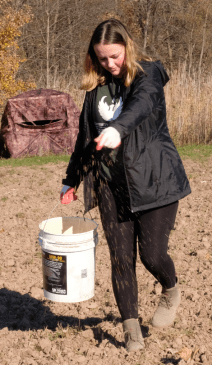
Sustainability work requires multitudes of people collaborating on complex goals. It’s impossible to tackle the challenges we face alone. This November, the Office of Sustainability wants to thank:
- Amy Wolf, twenty students from her Conservation Biology class, three of her graduate students, four Cofrin Center for Biodiversity staff, and eight community members of the Northeast Wisconsin Land Trust, who hand seeded 4.5 acres of oak savannah and four wet prairie areas. This is part of an ongoing grant-funded project to restore an oak savannah ecosystem and habitat.
- Four newly hired Sustainability Interns:
- Cece Austin ’22 is a Biology major with an ecology and conservation emphasis. She is compiling and analyzing data for UWGB’s greenhouse gas inventory and will assist in making recommendations for our Climate Action Plan for reducing carbon emissions.
- Molly Frizzell ’24 is an Environmental Policy & Planning and Political Science double major in her second year. She is developing a peer-to-peer program to support students interested in making personal and systemic changes for a sustainable future.
- Tania Rojas Carbajal has a civil engineering background and recently started in the Environmental Science & Policy master’s program with a concentration in ecosystems studies. She is researching options for installing electric vehicle charging stations on campus, analyzing our course catalog to identify opportunities for infusing sustainability throughout the curriculum, and supporting a variety of other projects.
- Bryce Oysti ’24 is studying biology, psychology, and philosophy. As the Sustainability Intern for the University Union, he composts food waste from the dining hall, manages the Ozzi reusable food container program, and oversees other sustainability efforts in the university union.
- Paul Pinkston, Brad Gajeski, and the entire UWGB Grounds team for getting certified through the WI Salt Wise program. They reduced the amount of salt applied to roads and sidewalks from 325 tons in 2018/19 to 66 tons in 2020/21 (not to mention reductions in brine too). By using better management practices and applying just enough salt/brine, we’re able to de-ice while reducing the damaging effects of salt on our waterways, soil, plant and animal communities, infrastructure, and even our pets.
- Environmental Management & Business Institute’s Executive Committee for launching a Sustainability Minor, which has attracted 5 students so far!
- Twenty-three UWGB instructors awarded the Phoenix Green Teacher Badge for promoting environmental sustainability in their teaching and seeking to minimize negative environmental impacts associated with teaching.

